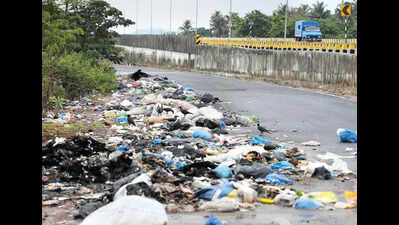ARTICLE AD BOX

Colva: The much-anticipated Western Bypass and its service roads may have drastically cut down travel time, but they have unfortunately taken on a far less welcome identity — as an unofficial garbage dumping zone.
Stretching across 2.7km from Navelim through Benaulim to Seraulim, this stretch of the bypass is now marred by piles of garbage, creating not just an eyesore but a looming environmental hazard.Plastic waste is discarded along the stretch. Locals and environmentalists fear that these pollutants could eventually find their way into the region’s water bodies since the road cuts through ecologically sensitive catchment areas.
The problem is aggravated by the lack of a scientific and decentralised waste collection system in the peripheral villages surrounding Margao. Villagers often end up discarding garbage along roadsides, especially wet waste which is not collected regularly.With the Margao Municipal Council (MMC) reportedly imposing heavy fines on non-Margao residents using its waste collection stations, residents from neighbouring villages find themselves caught in a bind.
Former MMC chairperson Savio Coutinho blamed the worsening situation on the systemic failure of local governance.“This crisis stems from a lack of political will and citizen engagement. I had proposed a model where village waste — if properly segregated — could be accepted by the city’s waste management system for a nominal fee,” Coutinho said. “Blaming villagers alone is unjust. City dwellers too have been seen dumping garbage along the bypass.”Coutinho also emphasised that penalties alone cannot curb the problem. “People will always find a place to dump their garbage if no structured disposal system exists,” he said. “Restrictions without solutions only worsen illegal dumping.”Local activist Santan Pereira from Benaulim echoed similar concerns. “Our panchayats have no facilities for wet waste disposal,” he said. “While they collect dry waste once a week, wet waste remains unaddressed.
Naturally, roadside dumping becomes the go-to solution.”Pereira also raised questions about inconsistent policies and poor regulation. “Panchayats permit chicken slaughter stalls without any verification of waste disposal methods,” he said. “Residential projects are sanctioned without checking if proper garbage systems are in place. All of this leads to more waste — much of it organic — being dumped on roadsides.”While every village panchayat technically has a garbage management committee, Pereira said these committees rarely meet or function as intended. “What’s the point of having these committees on paper if they don’t take active steps to address this pressing issue?” he said.Without urgent coordination between municipal authorities, panchayats, and state govt, and without sustainable, village-level waste management solutions, this convenience corridor could soon become an environmental catastrophe in the making, Coutinho said.
Get the latest lifestyle updates on Times of India, along with Eid wishes, messages, and quotes !



.png)
.png)
.png)
















 1 week ago
7
1 week ago
7









 English (US) ·
English (US) ·